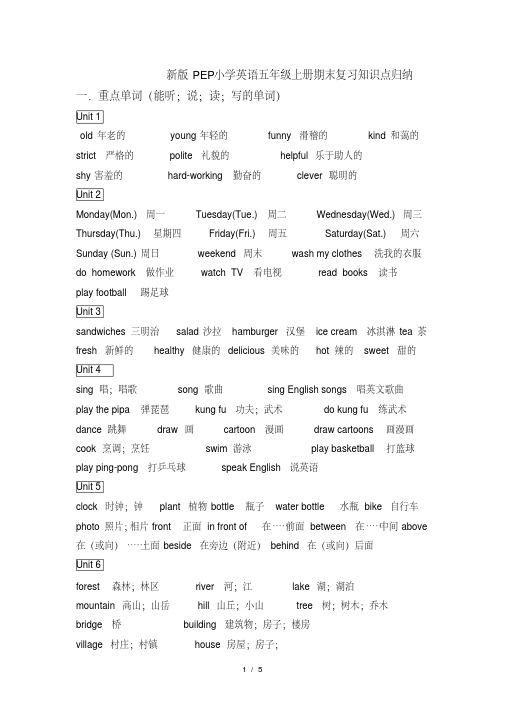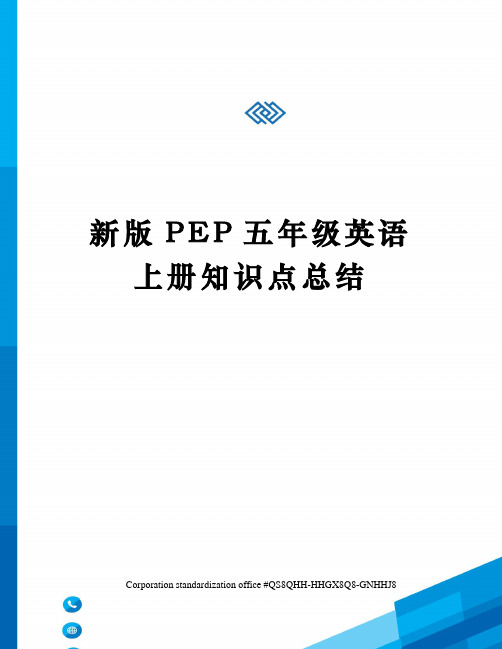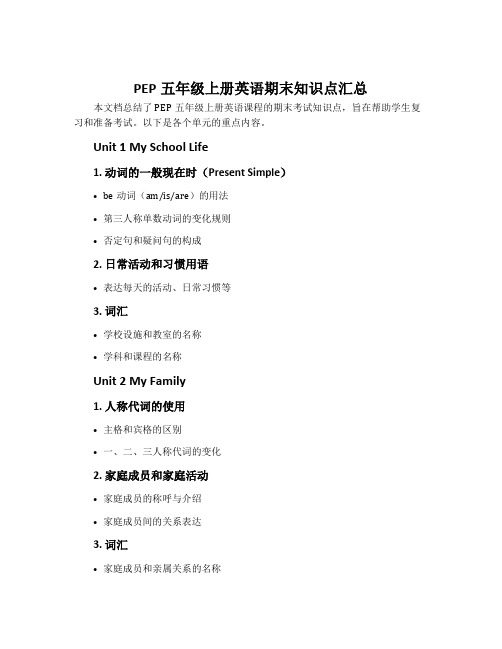新版PEP5 英语五上期末知识点总结
新版PEP小学英语五年级上册期末复习知识点归纳(完美版)

新版PEP小学英语五年级上册期末复习知识点归纳一.重点单词(能听;说;读;写的单词)Unit 1old年老的young年轻的funny 滑稽的kind和蔼的strict严格的polite 礼貌的helpful乐于助人的shy害羞的hard-working勤奋的clever聪明的Unit 2Monday(Mon.) 周一Tuesday(Tue.) 周二Wednesday(Wed.)周三Thursday(Thu.) 星期四Friday(Fri.) 周五Saturday(Sat.) 周六Sunday (Sun.)周日weekend 周末wash my clothes 洗我的衣服do homework 做作业watch TV 看电视read books 读书play football 踢足球Unit 3sandwiches三明治salad沙拉hamburger汉堡ice cream 冰淇淋tea茶fresh新鲜的healthy健康的delicious美味的hot辣的sweet 甜的Unit 4sing 唱;唱歌song 歌曲sing English songs 唱英文歌曲play the pipa 弹琵琶kung fu 功夫;武术do kung fu 练武术dance 跳舞draw 画cartoon 漫画draw cartoons 画漫画cook 烹调;烹饪swim 游泳play basketball 打篮球play ping-pong 打乒乓球speak English 说英语Unit 5clock 时钟;钟plant 植物bottle 瓶子water bottle 水瓶bike 自行车photo照片;相片front 正面in front of 在……前面between 在……中间above 在(或向)……上面beside 在旁边(附近)behind 在(或向)后面Unit 6forest 森林;林区river 河;江lake 湖;湖泊mountain 高山;山岳hill 山丘;小山tree 树;树木;乔木bridge 桥building 建筑物;房子;楼房village 村庄;村镇house 房屋;房子;二、一起来拼读本册课本中学到的语音及单词:发音y/i/ baby宝宝happy开心的candy糖果windy刮风的sunny晴朗的sorry 对不起发音/i:/ read 读书feed 喂养beef牛肉feet双脚meet遇见tea 茶eat吃发音/a?/ flower 花how 如何;怎样cow 奶牛wow 哇down 向下发音/??/slow 慢的snow 雪yellow 黄色window 窗户发音/u/ book书look看football足球good好的cook 烹饪发音/u:/ balloon 气球food 食物zoo 动物园noodles 面条cool 酷afternoon 下午发音/ei/rainy下雨的rainbow彩虹paint涂wait 等候say 说way方向birthday 生日Monday 星期一today 今天发音/a?/ house房子mouse老鼠sound 声音count数数三、重点句型:Unit11.--Who’s your art teacher? 谁是你的美术老师---Mr Jones.琼斯老师.2.---Is he young? 他年轻吗?--- Yes,he is. 是的;他年轻. --- No,he isn’t.不;他不年轻.3.---What’s Wu Yifan like? 吴一帆长什么---He’s hard-working. 他很勤奋.4.---What’s she like? 她长得怎么样?---She’s kind. 她是亲切的.5.Ms Wang will be our new Chinese teacher.王老师会成为我们的新语文老师.6.He is very helpful at home. 他在家很能干.7.He can speak Chinese and English.他会说汉语和英语.8.He makes me finish my homework.他让我写作业.注意:Be动词(is,am,are)用法:我用am你用are;is跟着他她它;单数用is;复数要用are.1.----What day is it today?今天是星期几---It’s Saturday.今天星期六.2.---What do you have on Thursdays ?星期四你们上什么课?--- I have math,English and music .我们上数学英语和音乐课.3.---What do you do on Thursdays, Grandpa?爷爷;星期四你要做什么?---I have a cooking class with your grandma.我要和你奶奶去上烹饪课.4.---Do you often read books in this park?你经常在这个公园看书吗?不是---Yes,I do.是的---No,I don’t.5.Look at my picture.看我的图片.6.You look tired. 你看起来很累.注意:(合成词)day:Monday;Tuesday;Wednesday;Thursday;Friday;Saturday;SundayUnit31..----What would you like to eat?你想吃什么?---A sandwich,please.请给我一个三明治.2.---What would you like to drink? 你想喝什么?--- I’d like some water. 我想喝点水.3.---What’s your favourite food? 你最喜欢吃什么食物?---Noodles.They are delicious. 面条;面条很好吃.4.My/His /Her favourite food is fish.我/他/她最喜欢的食物是鱼.5.I’m hungry/thirsty.我饿了/渴了.6.I don’t like beef but chicken is OK. 我你喜欢牛肉但是鸡肉可以.注意:单复数变化规则:一般情况加s;以o、s、x、ch、sh结尾加es.1.------What can you do for the party;children?孩子们;你们能为联欢会做什么?-------I can sing English songs.我会唱英文歌.2.----Can you do any kung fu ,John ?约翰;你会武术吗不;我不会.------Yes, I can. 是的;我会武术.No,I can’t我会打乒乓;但我不会游泳.3.I can play ping-pong,but I can’t swim.注意:1.定冠词the的用法:体育运动前不用the;乐器前面要用the.2. some只用于肯定句;否定句和疑问句中用any.I can do some kung fu.I can’t do any kung fu. Can you do any kung fu?Unit 51.There is a big bed.这里有张大床.2.There are so many picture here.这里有这么多幅画.3.Your room is realy nice.你的房间真好看.4..我的电脑在这儿桌子上.5. ----Where is the ball? 球在哪里----It’s in front of the dog.它在狗的前面.6. My grandparents have a garden in front of their house.我的祖父母有一个花园在房子前面.7.There are lots of flowers in it.在里面有许多花.注意:There is/are句型构成:There is/are + 物体+ 方位词+ 地方.如:There is a cat in front of the table. 桌子前面有一只猫.There are two pictures on the wall. 墙上有两幅图画.1---Is there a river in the forest;Miss White?怀特小姐;森林里有河吗?不森林里没有河.----No,there isn’t.2.----Are there any tall buildings in the nature park?自然公园里有高楼吗?-----No, there aren’t . 不;自然公园里没有高楼.注意:(一般疑问句)Is there a/an…? Yes, there is. No, there isn’t.? Yes, there are. No, there aren’t.Are there any…。
PEP五年级英语上册期末总复习1至6单元知识点归纳整理

3. —Do you know her? —Yes,____A_____. A. I do B. I am C. You do
解析:看关键词,用Do you问,就用Yes, I do或者No, I don’t答;选A.
任务一:在习题本上写出以下表示星期的单词和活动的短语, 全部正确可得2分; 星期一 __M_o_n__d_a_y_ 星期二_T_u_e_s_d_a_y__ 星期三 W__e_d_n_e_s_d_a_y 星期四_T__h_u_r_s_d_a_y_ 星期五__F_r_id__a_y__ 星期六__S_a_tu__rd__a_y_ 星期日__S_u_n_d_a_y__ 周末_w_e_e_k_e_n_d_ 洗我的衣服_w_a_s_h_m__y__cl_o_t_hes 看电视_w__a_tc_h__T_V____ 做作业_d__o_m__y_h_o_m__e_w_o_r_k__ 看书__r_e_a_d__b_o_o_k_s____ 踢足球__p_l_a_y_f_o_o_t_b_a_ll___
A. Yes, he does. B. No, she don’t. C. Yes, she does. 解析:看关键词Does Amy,Does后是人名或称呼,要分清 性别来确定用she还是用he;Amy 时女孩名所以选C.
任务四:辨析相似句 (全对可得2分) 1. — __B____do you ______ on Mondays?
个空应填have;由此正确答案是B
2. —__A___ do you_____ on the weekend? — I often do homework and watch TV. A. What…do B. What… have C. Where…do
新版PEP五年级英语上册知识点总结

新版P E P五年级英语上册知识点总结Corporation standardization office #QS8QHH-HHGX8Q8-GNHHJ8PEP五年级上册复习提纲Unit 1 What’s he like?old 老的,年纪大的young年轻的,岁数不大的funny滑稽的,可笑的kind 体贴的,慈祥的,宽容的strict 要求严格的,严厉的polite 有礼貌的,客气的shy 羞怯的,腼腆的,怕生的helpful 有用的,愿意帮忙的clever聪明的,聪颖的hard-working工作努力的,辛勤的music 音乐art 美术science 科学English 英语maths/math 数学Chinese 语文,中文sometimes 有时,间或robot 机器人speak 会说,会讲(某种语言);用(某种语言)说话know 知道;了解our 我们的him 他(用做宾语或表语)finish 完成;做好1. —Who’s your art teacher? 谁是你的美术老师?—Mr. Jones. 琼斯老师。
2. —Is he young? 他年轻吗?—Yes, he is. 是的,他年轻。
—No, he isn’t. 不,他不年轻。
3. —What’s Wu Yifan like? 吴一帆怎样?—He’s hard -working. 他很勤奋。
4. Ms Wang will be our new Chinese teacher. 王老师会成为我们的新语文老师。
5. He is very helpful at home . 他在家很能干。
6. Robin is short but strong. 罗宾个子矮,但是身体强壮。
7. He can speak Chinese and English . 他会说中文和英语。
8. He他让我写作业。
字母y 在单词中的发音:1、双音节或多音节词末发[ i ]。
pep五年级上册英语期末知识点汇总

PEP五年级上册英语期末知识点汇总本文档总结了PEP五年级上册英语课程的期末考试知识点,旨在帮助学生复习和准备考试。
以下是各个单元的重点内容。
Unit 1 My School Life1. 动词的一般现在时(Present Simple)•be动词(am/is/are)的用法•第三人称单数动词的变化规则•否定句和疑问句的构成2. 日常活动和习惯用语•表达每天的活动、日常习惯等3. 词汇•学校设施和教室的名称•学科和课程的名称Unit 2 My Family1. 人称代词的使用•主格和宾格的区别•一、二、三人称代词的变化2. 家庭成员和家庭活动•家庭成员的称呼与介绍•家庭成员间的关系表达3. 词汇•家庭成员和亲属关系的名称•家庭活动的词汇Unit 3 My Hobbies1. 现在进行时(Present Continuous)•现在进行时的构成和用法•表达当前正在进行的活动2. 爱好和运动•表达各种爱好和运动•谈论自己和他人的喜好3. 词汇•不同类型的爱好和运动的名称•色彩和绘画的相关单词Unit 4 At the Zoo1. 介词的使用•介词in、on、at的用法•表达位置和位置关系2. 动物及其特征•常见动物的名称和特点•描述动物的外貌和习性3. 词汇•各类动物和动物的特征名称•表达地点和位置关系的词汇Unit 5 On the Farm1. 表达数量和存在•数词和数量表达方式•存在动词there is/are的用法2. 农场和农作物•描述农场的事物和场景•农作物的名称和相关特点3. 词汇•农场和农作物的名称和功能•数字和数量的表达方式总结通过对PEP五年级上册英语课程期末考试的知识点进行汇总,我们可以帮助学生对每个单元的重点内容进行复习和整理。
这些知识点包括动词的一般现在时、日常活动和习惯用语、人称代词、家庭成员和家庭活动、现在进行时、爱好和运动、介词的使用、动物及其特征、农场和农作物等。
希望本文档对学生复习和考试有所帮助!。
新版PEP小学英语五年级(上册)期末复习知识点归纳

新版PEP小学英语五年级(上册)期末复习知识点归纳In the 5th grade English textbook。
there are several key words that students should be able to listen to。
speak。
read。
and write。
In Unit 1.some of these words include "old," "young," "funny," "kind," "strict," "polite," "helpful," "shy," "hard-working," and "clever." ___ people.In Unit 2.students learn the days of the week and some common activities。
The days of the week are "Monday" (abbreviated as "Mon.")。
"Tuesday" (abbreviated as "Tue.")。
"Wednesday" (abbreviated as "Wed.")。
"Thursday" (abbreviated as "Thu.")。
"Friday" (abbreviated as "Fri.")。
"Saturday" (abbreviated as "Sat.")。
新版PEP五年级英语上册知识点总结

新版P E P五年级英语上册知识点总结The document was prepared on January 2, 2021PEP五年级上册复习提纲Unit 1 What’s he likeold 老的,年纪大的young年轻的,岁数不大的funny滑稽的,可笑的kind 体贴的,慈祥的,宽容的strict 要求严格的,严厉的polite 有礼貌的,客气的shy 羞怯的,腼腆的,怕生的helpful 有用的,愿意帮忙的clever聪明的,聪颖的hard-working工作努力的,辛勤的music 音乐art 美术science 科学English 英语maths/math 数学Chinese 语文,中文sometimes 有时,间或robot 机器人speak 会说,会讲某种语言;用某种语言说话know 知道;了解our 我们的him 他用做宾语或表语finish 完成;做好1. —Who’s your art teacher谁是你的美术老师—Mr. Jones. 琼斯老师.2. —Is he young 他年轻吗—Yes, he is. 是的,他年轻.—No, he isn’t. 不,他不年轻.3. —What’s Wu Yifan like吴一帆怎样—He’s hard-working. 他很勤奋.4. Ms Wang will be our new Chinese teacher. 王老师会成为我们的新语文老师.5. He is very helpful at home. 他在家很能干.6. Robin is short but strong. 罗宾个子矮,但是身体强壮.7. He can speak Chinese and English. 他会说中文和英语.8. He 他让我写作业.字母y在单词中的发音:1、双音节或多音节词末发 i .例:bab y happ y windy sunn y sorr y cand y man y famil y part y 婴儿开心的有风的晴朗的对不起糖果许多家庭聚会课外补充:2、y在单音节词末发 ai例:b y 乘坐 m y 我的 wh y 为什么 cr y 哭 fl y 飞1、询问他人的外貌或性格:-What’s he/she like- He/She is kind/…2、一般疑问句的问与答:—Is he/she…—Yes, he/she is.—No, he/she isn’t.—Do you know… —Yes, I do. —No, I don’t3、be 动词的三种形式am, is, are 与人称代词连用的用法:I + am,He, she, it,人名、物名+ is We, you, they + are4、Ms., Miss, Mr., Mrs.的区别:Ms. miz 缩略词用于女子的姓氏或姓名前,不指明婚否女士; Miss mis 用于未婚女子的姓氏或姓名前,以示礼貌小姐,女士; Mr. mistmister 的缩略词用于男子的姓氏或姓名前先生; Mrs. misiz 用于已婚女子的姓氏或姓名前太太;夫人. 5、and 和but 的区别:and “和,与”,表并列关系 He is . 他又高又瘦.but “但是”,表转折关系 He is . 他个子矮,但是身体强壮Unit 2 My weekSunday Sun. 周日 Monday Mon. 周一 Tuesday Tues. 周二 Wednesday Wed.周三 Thursday Thurs. 周四Friday Fri. 周五 Saturday Sat. 周六 weekend 周末周六、日 wash my clothes 洗衣服 watch TV 看电视do homework 做作业 read books 看书 play football 踢足球 on the weekend 在周末play sports/do sports 做体育运动listen to music 听音乐play ping-pong 打乒乓球cooking 烹饪,烹调often 时常;常常park 公园tired 疲倦的should 应该;应当every 每一个,每个day 一天;一日schedule 工作计划;日程安排1.on Thursday星期四你们上什么课—I have math, English and music. 我们上数学、英语和音乐课.2.星期四你要做什么—I often play basketball with Mike. 我经常和Mike一起打篮球.3. —Do you often read books in this park你经常在这个公园看书吗—Yes, I do.是的—No, I don’t.不是4. Look at my picture. 看我的图片.字母组合ee, ea在单词中的的发音: i:例:f ee t b ee f m ee t s ee f ee d t ea r ea d ea t rep ea t 脚牛肉遇见看见喂养茶阅读吃重复注:1、ee组合绝大部分发长音 i: ,只有少部分发短音 i ,如:coffee 咖啡2、ea字母组合除了发 i: ,还有可能发 e 等发音,如:bread 面包,或者发 ei ,如:great 好极了询问做什么事/活动:—What do you do …—I often play ping-pong…询问星期几上什么课:—What do you have on…—We have English class…2、一般疑问句的问与答:—Do you often read books—Yes, I do. —No, I don’t.4、play + 球类、棋类、娱乐活动,如:play football/ping-pong补充:play + the + 乐器第四单元知识,如:play the pipa/piano/violin…Unit 3 What would you likeice cream 冰淇淋hamburger 汉堡包tea 茶sandwich 三文治salad沙拉fresh 新鲜的,刚摘的healthy 健康的delicious 美味的;可口的hot 辣的;辛辣的sweet 含糖的;甜的hungry 饿的thirsty 渴的;口渴的favourite 特别喜爱的food 食物drink 喝;饮carrot 胡萝卜chicken 鸡肉onion 洋葱milk 牛奶bread 面包beef noodles 牛肉面fish sandwich 鱼肉三明治tomato soup 西红柿汤1.—What would you like to你想吃什么—A sandwich, please. 请给我一个三明治.你想喝什么—I’d like some water. 我想喝点水.2. —What’s your favourite food 你最喜欢吃什么食物—Noodles. They are delicious. 面条.面条很好吃.3. My/His /Her favourite food is fish. 我/他/她最喜欢的食物是鱼.4. I’m hungry/thirsty. 我饿/渴了.5. I don’t like beef but chicken is OK. 我不喜欢牛肉但是鸡肉也可以.6. Salad is my favourite food. 沙拉是我最喜欢的食物.7. I like vegetables but not carrots.我喜欢吃蔬菜但不喜欢胡萝卜.字母组合ow在单词中的发音: au ,例: au c ow fl ow er w ow d ow n h ow n ow奶牛花哇向下如何,怎样现在sl ow慢的 sn ow雪 yell ow黄色 wind ow窗户 sn ow y 下雪的 tomorr ow明天1、询问想要吃/喝什么:—What would you like to eat/drink—I’d like…2、询问最喜欢的事物:—What’s your favourite food/vegetable/fruit…—My favourite food/…is…/I like…3、名词复数的规则变化:1直接加s;2以s, x, sh, ch结尾的,加es,如, bus es box es sandwich es3以o结尾,有生命的加es,如,potato es tomato es无生命的加s,如,photo s piano s zoo s补充:4以辅音加y结尾,改y为i再加es,如,famil ies bab ies以元音加y结尾,直接加s,如,boy s day s5以f或fe结尾,改f为v再加es,如knife-kni ves小刀 leaf-lea ves树叶4、some+可数/不可数名词例:some apple s可数 some water/rice/juice/bread/…不可数Unit 4 What can you dodance跳舞sing English songs 唱英文歌曲play the pipa弹琵琶do kung fu 打功夫draw cartoons 画漫画swim 游泳speak English说英语cook 烹饪,烹调play basketball 打篮球play ping-pong打兵乓球draw pictures 画画clean the classroom 打扫课室party 聚会;派对next 下一个;紧接着learn 学习;学会wonderful 极好的;了不起的any 任何的;任一的problem 问题no problem 没问题want 想要send 邮寄;发送email 电子邮件at后面接邮件地址1. We’ll have an English party next Tuesday 我们下周二将举行英语派对.2. —What can you do for the party你能为派对做些什么呢—I can sing English songs. 我能唱英文歌.3. How/What about you你呢4. —Can you do any kung fu你会打功夫吗—Yes, I can. 是的,我会.—No, I can’t. 不,我不会.5. No problem. I can help you. 没问题.我会帮你.6. I can play ping-pong, but I can’t swim. 我会打乒乓球,但我不会游泳.7. —Can you swim 你会游泳吗—Yes, I can. 是的,我会.—No, I can’t. 不,我不会.字母组合oo在单词中的发音: u , u:例: u l oo k 看 g oo d 好的 b oo k 书 c oo k 烹饪 w oo d 木头 f oo t 脚助记口诀: 1. 看look好good书book,砍柴wood做饭cook洗脚foot.2. 押韵记忆:Look good book, cook wood foot.u: ball oo n 气球 f oo d 食物 z oo动物园 n oo dles 面条注:字母组合oo发音少数发短音 u ,多数发长音 u: .1、询问对方会做什么事情:—What can you do —I can play the pipa.2、can句型的否定句:I can’t play the pipa.3、can句型的一般疑问句的问与答:—Can you do any kung fu—Yes, I can./No, I can’t.4、play + the + 乐器,例 play the erhu /pipa /piano…play + 球类、棋类、娱乐活动,例 play basketball/football/ping-pong… 5、some 与any 的异同: 相同之处:都有“一些”的含义;不同之处:some+可数名词复数/不可数名词用于肯定句中例:I can do some kung fu. 我会打功夫.any+可数名词复数/不可数名词用于否定句或疑问句中 例:I can’t do any kung fu. 我不会打功夫. Can you do any kung fu 你会打功夫吗Unit 5 There is a big bedclock 时钟,钟 photo 照片,相片 plant 植物 water bottle 水瓶 bike 自行车,脚踏车 in front of 在……前面 beside 在旁边附近between 在……中间 behind 在或向……后面 above 在或向……上面 so many 许多 their 他们的 lots of 许多 dirty 肮脏的near 在附近 house 房屋,房子 flower 花,花朵 move 搬家everywhere 处处,到处 their 他们的;她们的;它们的grandparent 祖父;祖母;外祖父;外祖母1. Your room is really nice你的房间真漂亮2. There is a big bed. 有一张床.3. My computer is here on the desk. 我的电脑在书桌这里.4. This is my room. 这是我的房间.5. There are so many picture这有许多照片.6. My father can draw very well. 我父亲画的很好.7 .—Where is the ball球在哪里—It’s in front of the dog. 在狗的前面.8. There is a tree in front of the house. 在房子前有棵树.9. I live near the nature park. 我住在自然公园附近.字母组合ai, ay在单词中的发音: ei例:r ai ny 下雨的 r ai nbow 彩虹 p ai nt 涂色 w ai t 等待s ay说 w ay路,方法 birthd ay生日 Mond ay周一 d ay天,日子 tod ay今天m ay可以课外补充:元音字母a在开音节中也发 ei 例:c a ke 蛋糕 f a ce 脸 n a me 名字1、there beis, are句型的单复数形式:There is a clock. There are lots of课外补充:1There be句型的动词就近原则:例:There isThere are2there be与have/has的异同:2、询问方位或地点:—Where is the ball —It’s in front of the dog.表位置用介词及介词短语in on beside behind in front of over between above如:Thereisaclock in my room. There is a ruler on the desk.There are some plants beside the table. There is a dog behind the house.There are many photos in front of the desk. There is a bridge over the river. There is a book between a ruler and an eraser. There is a light above the desk.Unit 6 In a nature parkforest 森林,林区hill 山丘,小山river 河;江mountain高山,山岳lake湖;湖泊village村庄,村镇house房屋,房子,住宅tree 树,树木,乔木bridge桥building建筑物;房子;楼房go boating 去划船nature park 自然公园people 人,人们rabbit 兔子duck 鸭子animal 动物high 高的children 孩子们child的复数形式1. Children, let’s go to the forest. 孩子们,让我们去森林吧.2. —Is there a river in the forest森林里有河流吗—Yes, there is.是,有的.—No, there isn’t.不,没有.3. The nature park is so quiet自然公园这么安静4. There aren’t many people. 这里人不多.5. —Are there自然公园里有高楼吗—Yes, there are.是,有的.—No, there aren’t.不,没有.字母组合ou在单词中的发音: au例:h ou se 房屋,房子 m ou se 老鼠 s ou nd 声音,听起来 c ou nt 数数提示:字母组合ow也有些发 au ,例:c ow奶牛 h ow如何,怎样 d ow n 向下课外补充:字母组合ou在单词中还可读 u: ,如s ou p 汤 gr ou p 群,团体;和,如y ou ng 年轻的.1、there be句型的一般疑问句的问与答:—Is there a lake2、3、—Yes, there is. —No, there isn’t.—Are there any animal s—Yes, there are. —No, there aren’t.2、there beis, are句型的单复数形式具体见Unit 5例:There is a nature park near the house.There are many duck3、some与any在肯定句、否定句及问句中的用法:some+可数名词复数/不可数名词用于肯定句中any+可数名词复数/不可数名词用于否定句或疑问句中4、people人,人们集体名词,明为单数,实为复数,词末不能加-s例:There are many people in the park.。
最新新版PEP英语五年级上册知识点归纳
最新新版PEP英语五年级上册知识点归纳本文档旨在对最新新版PEP英语五年级上册的知识点进行归纳总结,帮助学生更好地复和掌握课程内容。
1. Unit 1: Greetings 问候语- 研究如何问候他人并做出适当的回应。
- 掌握常用的问候用语,例如"Hello!"、"Good morning!"等。
2. Unit 2: School Life 学校生活- 研究有关学校生活的词汇,如"classroom"、"teacher"等。
- 了解并描述一天中的不同活动,如"morning exercise"、"English lesson"等。
3. Unit 3: Weather 天气- 研究不同的天气词汇,如"sunny"、"rainy"等。
- 能够简单描述不同天气条件下的服装要求。
4. Unit 4: My Family 我的家庭- 掌握有关家庭成员的词汇,如"father"、"mother"等。
- 研究如何简单地介绍自己的家庭以及各个家庭成员的职业。
5. Unit 5: Numbers 数字- 研究从1到100的基本数字。
- 能够根据要求做简单的数数练。
6. Unit 6: Colors 颜色- 掌握基本的颜色词汇,如"red"、"blue"等。
- 研究描述物体颜色的句型,如"It's a red apple."。
7. Unit 7: Animals 动物- 研究描述动物外貌和特征的词汇,如"big"、"fast"等。
- 能够简单地描述自己喜欢的动物,并说明理由。
8. Unit 8: Food 食物- 研究常见的食物名称,如"apple"、"hamburger"等。
【精编】新版PEP小学五年级英语上册-期末总复习知识点2021
(打印版)PEP小学五年级英语上册期末总复习知识点Unit一.重点词汇old 年老地funny 滑稽可笑地tall 高地kind 与蔼地亲切地外貌特征young 年轻地性格特点strict 严格地short 矮地smart 聪明地巧妙地thin 瘦地active 积极地活跃地strong 强壮地quiet 安静地,文静地who ’s =who is 谁为what ’s=what is 为什么lady 女士Mr. 先生like 像、喜欢其他:very 非常but 但为so much ,很非常principal 校长university student 大学生he ’s =he is 他为she ’s =she is 她fun 有趣,逗笑Unit二、重点句型:1. 询问人-- Who ’s your art teacher? 谁为你地美术老师---Mr Jones. 琼斯老师。
---Who ’s that woman ? 那个妇女为谁?---She is my mother . 她为我妈妈。
2. 询问人地外貌特征--- What ’s she like?她长得怎么样?--- She ’s kind她. 为亲切地。
--- What ’s Wu Yifan like? 吴一帆什么样?--- He ’s har-d working. 他很勤奋。
---Is he young? 他年轻吗?--- Yes,he is. 为地,他年轻。
--- No,he isn3. 询问人地性格特点不’,他t. 不年轻。
----- Is she very quiet ? 她很文静吗? ----- No ,she isn ’t. She ’s very active . 不,她很活跃。
----- Is she very strict ? 她很严厉吗?----- Yes , she is . But she is very kind. 为地。
(完整word版)新版PEP五年级英语上册知识点总结.docx
三小学五年上册期末复料新版 PEP 五年级上册知识点总结姓名班级Unit 1重点单词old老的,年大的helpful有用的,愿意帮忙的English英young年的,数不大的clever明的,的maths/math数学funny滑稽的,可笑的hard-working Chinese文,中文kind体的,慈祥的,容的工作努力的,辛勤的sometimes有,或strict要求格的,的music音robot机器人polite有礼貌的,客气的art美speak会,会(某种言);shy羞怯的,腆的,怕生的science科学用(某种言)重点句子1.— Who’s your art teacher?是你的美老?— Mr . Jones.斯老。
2.—Is he young?他年?—Yes, he is.是的,他年。
— No, he isn’ t不.,他不年。
3.— What ’s Wu Yifan like ? 吴一帆怎?— He’ s hard-working.他很勤。
4.Ms Wang will be our new Chinese teacher.王老会成我的新文老。
5.He is very helpful at home .他在家很能干。
6.Robin is short but strong.个子矮,但是身体壮。
7.He can speak Chinese and English.他会中文和英。
8.He makes me finish my homework.他我写作。
语音字母 y 在中的音: 1 、双音或多音末[ i ] 。
例: bab y happ y windy sunn y sorr y cand y man y famil y part y 儿开心的有的晴朗的不起糖果多家庭聚会外充: 2、 y 在音末[ ai ]例: by 乘坐m y 我的why什么cry 哭fly重点知识及语法1、他人的外貌或性格:-What’s he/she like?- He/She is kind/⋯2、一般疑句的与答:—Is he/she⋯ ?—Yes, he/she is.—No, he/she isn’ t.—Do you know ⋯ ?—Yes, I do.—No, I don’t3、 be 的三种形式am, is, are与人称代用的用法:I + am,He, she, it,人名、物名+ is口:我用am,你用are, is用于他、她、它,所有复数都用are 。
新版PEP小学英语五年级上册期末复习知识点归纳(2)(K12教育文档)
新版PEP小学英语五年级上册期末复习知识点归纳(2)(word版可编辑修改) 编辑整理:尊敬的读者朋友们:这里是精品文档编辑中心,本文档内容是由我和我的同事精心编辑整理后发布的,发布之前我们对文中内容进行仔细校对,但是难免会有疏漏的地方,但是任然希望(新版PEP小学英语五年级上册期末复习知识点归纳(2)(word版可编辑修改))的内容能够给您的工作和学习带来便利。
同时也真诚的希望收到您的建议和反馈,这将是我们进步的源泉,前进的动力。
本文可编辑可修改,如果觉得对您有帮助请收藏以便随时查阅,最后祝您生活愉快业绩进步,以下为新版PEP小学英语五年级上册期末复习知识点归纳(2)(word版可编辑修改)的全部内容。
五年级英语上册期末总复习知识点一.重点单词(能听,说,读,写的单词)old年老的 young年轻的 funny 滑稽的 kind和蔼的strict严格的 polite 礼貌的 helpful乐于助人的shy害羞的 hard—working勤奋的 clever聪明的Monday(Mon。
) 周一 Tuesday(Tue.) 周二 Wednesday(Wed。
)周三Thursday(Thu.) 星期四 Friday(Fri。
)周五 Saturday(Sat。
) 周六Sunday (Sun。
)周日 weekend 周末 wash my clothes 洗我的衣服 do homework 做作业 watch TV 看电视 read books 读书play football 踢足球sandwiches三明治 salad沙拉 hamburger汉堡 ice cream 冰淇淋tea茶fresh新鲜的 healthy健康的 delicious美味的 hot辣的 sweet 甜的sing 唱;唱歌 song 歌曲 sing English songs 唱英文歌曲play the pipa 弹琵琶 kung fu 功夫;武术 do kung fu 练武术dance 跳舞 draw 画 cartoon 漫画 draw cartoons 画漫画cook 烹调;烹饪 swim 游泳 play basketball 打篮球play ping—pong 打乒乓球 speak English 说英语clock 时钟;钟 plant 植物bottle 瓶子 water bottle 水瓶 bike 自行车photo照片;相片front 正面 in front of 在……前面 between 在……中间above 在(或向)……上面beside 在旁边(附近)behind 在(或向)后面forest 森林;林区 river 河;江 lake 湖;湖泊mountain 高山;山岳 hill 山丘;小山 tree 树;树木;乔木bridge 桥 building 建筑物;房子;楼房village 村庄;村镇 house 房屋;房子;二、一起来拼读本册课本中学到的语音及单词:发音y/i/ baby宝宝 happy开心的 candy糖果 windy刮风的 sunny晴朗的 sorry 对不起发音/i:/ read 读书 feed 喂养 beef牛肉 feet双脚meet遇见 tea 茶 eat吃发音/aʊ/ flower 花 how 如何,怎样cow 奶牛wow 哇 down 向下发音/əʊ/ slow 慢的 snow 雪 yellow 黄色 window 窗户发音 /u/ book书 look看 football足球 good好的 cook 烹饪发音/u:/ balloon 气球food 食物zoo 动物园noodles 面条cool 酷afternoon 下午发音 /ei/ rainy下雨的 rainbow彩虹 paint涂 wait 等候say 说 way方向 birthday 生日Monday 星期一 today 今天发音/aʊ/ house房子 mouse老鼠 sound 声音 count数数三、重点句型:1.—-Who’s your art teacher?谁是你的美术老师—--Mr Jones。
- 1、下载文档前请自行甄别文档内容的完整性,平台不提供额外的编辑、内容补充、找答案等附加服务。
- 2、"仅部分预览"的文档,不可在线预览部分如存在完整性等问题,可反馈申请退款(可完整预览的文档不适用该条件!)。
- 3、如文档侵犯您的权益,请联系客服反馈,我们会尽快为您处理(人工客服工作时间:9:00-18:30)。
小学五年级上册期末复习资料新版PEP5期末知识点总结Unit 1young 年轻的,岁数不大的 funny 滑稽的,可笑的kind 体贴的,慈祥的,宽容的 strict 要求严格的,严厉的 polite 有礼貌的,客气的helpful 有用的,愿意帮忙的 clever 聪明的,聪颖的 hard-working工作努力的,辛勤的music 音乐 art 美术science 科学 English 英语 maths/math 数学 Chinese 语文,中文 sometimes 有时,间或 robot 机器人speak 会说,会讲(某种语言);用(某种语言)说话—Who’s your art teacher? 谁是你的美术老师? —Mr. Jones.琼斯老师。
2. —Is he young? 他年轻吗?—Yes, he is.是的,他年轻。
—No, he isn’t. 不,他不年轻。
3. —What’sWu Yifan like ? 吴一帆怎样? —He’s hard -working. 他很勤奋。
4. Ms Wang will be our new Chinese teacher. 王老师会成为我们的新语文老师。
5. He is very helpful at home . 他在家很能干。
6. Robin is short but strong. 罗宾个子矮,但是身体强壮。
他会说中文和英语。
他让我写作业。
字母y 在单词中的发音:1、双音节或多音节词末发[ i ]。
例:bab y happ y windy sunn y sorr y cand y man y famil y part y 婴儿 开心的 有风的 晴朗的 对不起 糖果 许多 家庭 聚会 课外补充:2、y 在单音节词末发[ ai ]m y 我的 wh y 为什么 cr y 哭 fl y 飞 -What’s he/she like? - He/She is kind/…2、一般疑问句的问与答:—Is he/she…?—Yes, he/she is. —No, he/she isn’t. —Do you know …? —Yes, I do. —No, I don ’t3、be 动词的三种形式am, is, are 与人称代词连用的用法:I + am,He, she, it ,人名、物名+ is We, you, they + are4、Ms., Miss, Mr., Mrs.的区别: Ms. [miz](缩略词)(用于女子的姓氏或姓名前,不指明婚否)女士; Miss [mis](用于未婚女子的姓氏或姓名前,以示礼貌)小姐,女士; Mr. [mist ](mister 的缩略词)(用于男子的姓氏或姓名前)先生; Mrs. [misiz](用于已婚女子的姓氏或姓名前)太太;夫人。
5、and 和but 的区别:and “和,与”,表并列关系 He is . 他又高又瘦。
but “但是”,表转折关系 He is . 他个子矮,但是身体强壮。
My …teacher/friend/…。
思路导引(1)开头:交代人物的身份 I have a/an …He/She is …(2)中间:1)体貌 He/ She is tall/strong … He/She has …hair/eyes … 2)性格 He/She is strict/kind …3)爱好 He/She likes playing pingi-pong/… 或He/She often read books/… on the weekend. (3)结尾:评价人物或抒发对人物的情感 I like him/her very much. 2、范文:My Chinese teacherI have a new Chinese teacher. She is Ms. Chen. She is tall and thin. She has big eyes and long black hair. She is kind and funny. Sometimes she is strict, too. She is hard-working. She likes reading. Her class is so much fun. We all like her.Unit 2Sunday (Sun.) 周日Monday (Mon.) 周一Tuesday (Tue./Tues.) 周二Wednesday (Wed./Weds.) 周三Thursday (Thur./Thurs.) 周四Saturday (Sat.) 周六weekend 周末(周六、日)wash my clothes 洗衣服watch TV 看电视do homework 做作业read books 看书play football 踢足球on the weekend在周末play sports/do sports 做体育运动listen to music 听音乐play ping-pong 打乒乓球on Thursday星期四你们上什么课?我们上数学、英语和音乐课。
2.爷爷,星期四你要做什么?—I have a cooking class with your grandma. 我和你奶奶去上烹饪课。
3. —Do you often read books in this park? 你经常在这个公园看书吗?—Yes, I do.是的—No, I don’t.不是4. Look at my picture. 看我的图片。
5. You look tired. 你看起来很累。
你应该每天做运动。
字母组合ee, ea在单词中的的发音:[ i: ]例:f ee t b ee f m ee t s ee f ee d t ea r ea dea t rep ea t脚牛肉遇见看见喂养茶阅读吃重复注:1、ee组合绝大部分发长音[ i: ],只有少部分发短音[ i ],如:coffee 咖啡[ i: ],还有可能发[ e ]等发音,如:bread 面包,或者发[ ei ],如:great 好极了1、询问做什么事/活动:—What do you do …? —I often play ping-pong…询问星期几上什么课:—What do you have on…? —We have English class…2—Yes, I do. —No, I don’t.3、,如:on Monday/Tuesday…课外’clock 在十二点整,如:in 2014 在2014年in the morning/afternoon/evening4、play + 球类、棋类、娱乐活动,如:play football/ping-pong,如:play the pipa/piano/violin…1、描写一周的生活,如:My week思路导引(1)开头:简单的自我介绍:My name’s…/ I’m…(2)中间:1)介绍周一至周五的情况,可以着重介绍自己最喜欢的那一天:I go to school from Monday to Friday. I like…because I have…2)介绍自己周六、日的活动:I often watch TV/…on the weekend.(3)结尾:This is my week. What about yours?2、范文:My weekMy name is Li Ming. I go to school from Monday to Friday. I like Tuesdays and Thursdays, because I have music and PE. I often do my homework and read books on Saturdays. I often play ping-pong on Sundays.冰淇淋hamburger 汉堡包tea 茶sandwich 三文治salad 沙拉fresh 新鲜的,刚摘的healthy 健康的hot 辣的;辛辣的sweet 含糖的;甜的hungry 饿的thirsty 渴的;口渴的favourite 特别喜爱的food 食物drink 喝;饮carrot 胡萝卜chicken 鸡肉onion 洋葱milk 牛奶bread 面包beef noodles 牛肉面fish sandwich 鱼肉三明治tomato soup 西红柿汤你想吃什么?—A sandwich, please. 请给我一个三明治。
你想喝什么?—I’d like some water. 我想喝点水。
—What’s your favourite food?你最喜欢吃什么食物?—Noodles. They are delicious. 面条。
面条很好吃。
3. My/His /Her favourite food is fish. 我/他/她最喜欢的食物是鱼。
4. I’m hungry/thirsty. 我饿/渴了。
5. I don’t like beef but chicken is OK. 我不喜欢牛肉但是鸡肉也可以。
6. Onions are my favourite vegetable. 洋葱是我最喜欢的蔬菜。
7. I like vegetables but not carrots. 我喜欢吃蔬菜但不喜欢胡萝卜。
ow在单词中的发音:[ au ] ,[例:[ au ] c ow奶牛fl ow er 花w ow哇d ow n 向下h ow如何,怎样n ow现在慢的sn ow雪yell ow黄色wind ow窗户sn ow y 下雪的tomorr ow明天What would you like to eat/drink? —I’d like…2、询问最喜欢的事物:—What’s your favourite food/vegetable/…? —My favourite food/…is…/I like…3、名词复数的规则变化:(1)直接加s;(2)以s, x, sh, ch结尾的,加es,如,bus es box es sandwich es(3)以o结尾,有生命的加es,如,potato es tomato es无生命的加s,如,photo s piano s zoo s补充:(4)以辅音加y结尾,改y为i再加es,如,famil ies bab ies以元音加y结尾,直接加s,如,boy s day s(5)以f或fe结尾,改f为v再加es,如knife-kni ves小刀leaf-lea ves树叶4、some+可数/不可数名词例:some apple s(可数)some water/rice/juice/bread/…(不可数)课外补充:不可数名词(词后不可以加-s/es,所接动词用单数is /V-s/es)液体water milk tea orange(桔汁)coke juice气体air(空气)食物food rice bread fruit肉类meat(肉)fish beef chickenpaper(纸)time music weather(天气)snow money思路导引(1)开头:简单介绍自己的家庭成员:There are…people in my family. They are…(2)中间:分别介绍每个家庭成员最喜爱的食物时什么:…favourite food is…/…is…favourite./…like(s)…best.(3)结尾:穿插说明喜欢的原因:It’s/They’re…2、范文:There are four people in my family. They are my parents, my brother and me. My mother likes salad best. It’s fresh. Beef is my father’s favourite. He thinks(认为)it’s delicious. My brother likes ice cream. It’s sweet. My favourite food is fish. It’s very healthy.dance 跳舞sing English songs 唱英文歌曲play the pipa 弹琵琶打功夫draw cartoons 画漫画swim 游泳speak English 说英语cook 烹饪,烹调play basketball 打篮球play ping-pong 打兵乓球draw pictures 画画clean the classroom 打扫课室1. We’ll have an English party next Tuesday! 我们下周二将举行英语派对。
